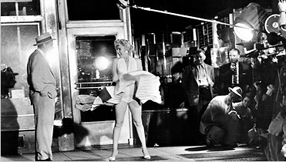 Marilyn Monroe is, quite naturally, most strongly associated with Hollywood, but she spent time in New York City, too.
Marilyn Monroe is, quite naturally, most strongly associated with Hollywood, but she spent time in New York City, too.
After all, her two husbands, Yankees outfielder Joe DiMaggio and playwright Arthur Miller both had strong New York connections, and she studied acting for some time with Lee Strasberg.
And then there’s her iconic role in Billy Wilder‘s The Seven Year Itch, which takes place in New York City (though most of it was filmed out west).
Pat Ryan, in a story in today’s New York Times, offers a Monroe mini-tour, with addresses and locales that were key to Monroe’s time in NYC, including the subway grate, over which her skirt was famously blown up in the aforementioned Seven Year Itch, the townhouse seen in that film in which her character and Tom Ewell‘s married but restless book editor both resided, a venerable dive bar on the East Side that she is said to have patronized, and a dozen other museums, business establishments and residences where Monroe spent time.
EDIT: After posting the above, we came across the blog Letteryheady, which features letterheads and stationery of the rich and famous. Among the letterheads featured is one for Marilyn Monroe Productions, Inc., which seems to have headquartered out of the apartment Monroe shared with her then-husband, the aforementioned Miller. That seems a bit odd.
But there’s one little tidbit of additional info found on that piece of stationery: a phone number. I don’t know if it was Arthur and Marilyn’s personal number, or if they had a second number added to serve as a business number, but here’s a dandy little item to add some cachet to your little black book: Marilyn Monroe’s phone number was once ELDORADO 5-2325.

 The fish men see her still, their Annie, in the hide-and-seek shadows of South Street. She’s telling her dirty jokes and doing anything for a buck: hustling newspapers, untaxed cigarettes, favors, those pairs of irregular socks she’d buy cheap on Canal. She’s submitting to the elements, calling out “Yoo-hoo” to the snow and the rain and her boys.
The fish men see her still, their Annie, in the hide-and-seek shadows of South Street. She’s telling her dirty jokes and doing anything for a buck: hustling newspapers, untaxed cigarettes, favors, those pairs of irregular socks she’d buy cheap on Canal. She’s submitting to the elements, calling out “Yoo-hoo” to the snow and the rain and her boys.